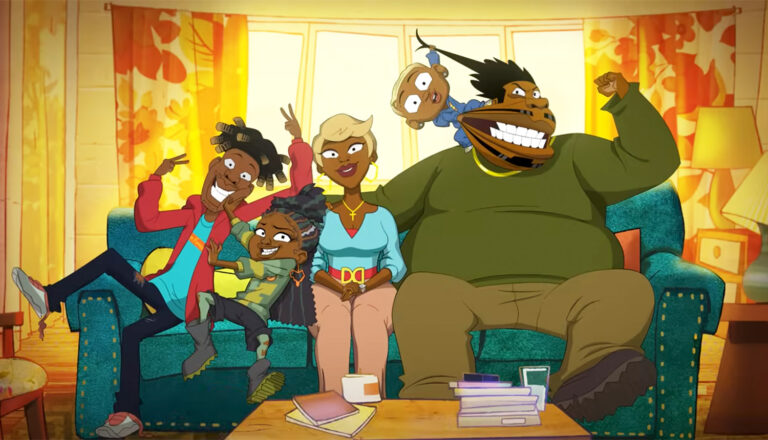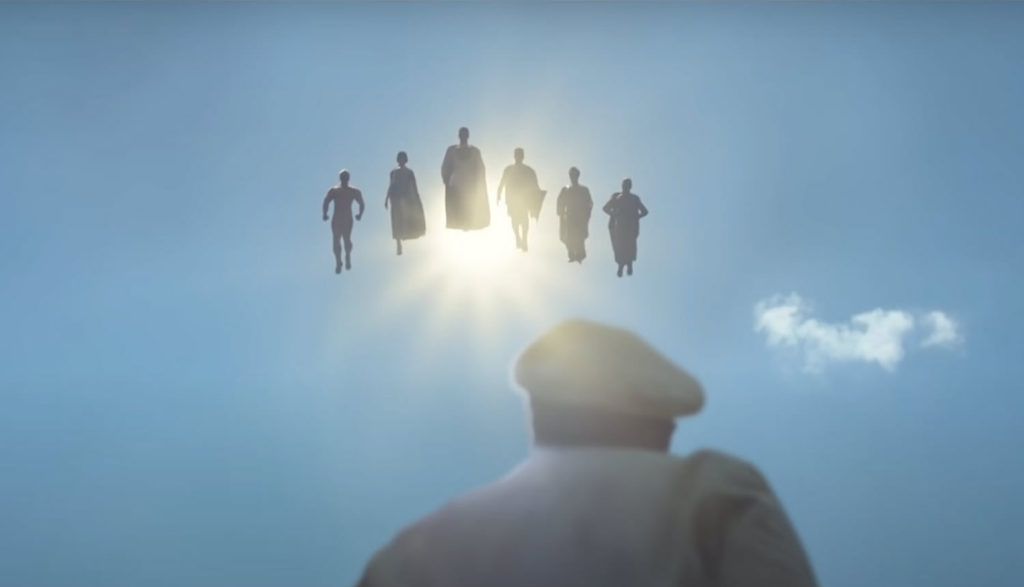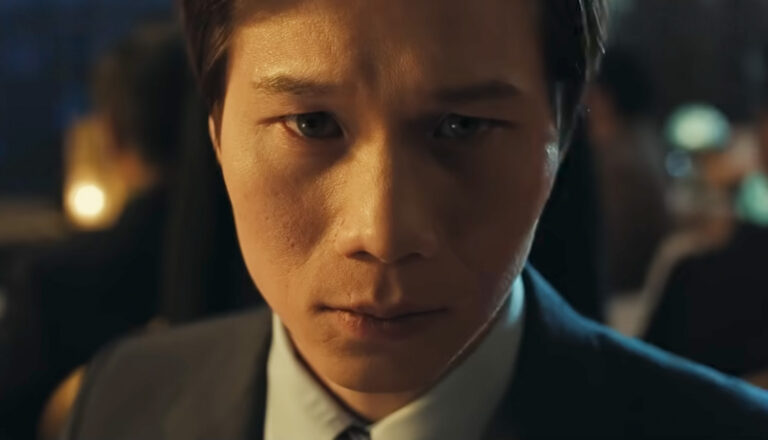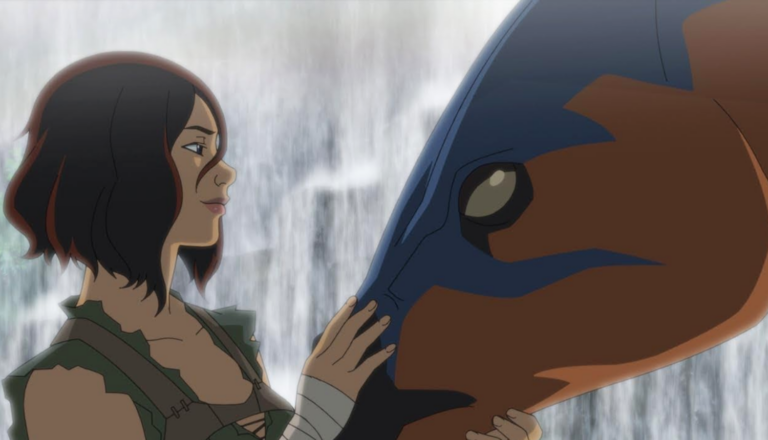
Good Times
Netflix takes a classic sitcom, Good Times, and turns it into a vulgar, violent, sexually-charged TV-MA show.

The Greatest Generation? Where does that leave other generations, huh? The Pretty Good Generation? The Reasonably OK Generation? The “I’m Disappointed in You” Generation?
Brandon Sampson knows the pressure of living up to impossible expectations. And in this case, “impossible” is hardly an exaggeration. See, Brandon’s pop, Sheldon, is the most powerful superhero on the planet: He can fly, zap things with his eyes, lift cruise ships, the whole bit. And while Brandon has plenty of superpowers too, he feels like he can never measure up to dear ol’ dad.
Why does he feel that way? Well, because his dad says as much.
It’s not that Sheldon—a superhero the world knows as Utopian—says his boy is a failure. But his expectations are as high as his own flight patterns. And he worries that Brandon may not be able to pick up his heavy mantle when the time comes.
“He’s not even close to being ready,” he tells his wife, Grace (aka Lady Liberty). “Maybe he never will be.”
That’s tough for Brandon to hear. And, because of his super-powered hearing, he does hear. Every word.
But Brandon at least tries. His sister, Chloe, stopped trying a long time ago. Forget doing good: She’s all about celebrity endorsements and parties these days. When Sheldon lectures Chloe about how her powers should be used to help the less fortunate, a drunk Chloe shoots back: “Everyone’s more fortunate than me, because they don’t have you as a dad.”
But Sheldon’s not just dealing with problems at home: The world is changing, too, as his superpowered brother is quick to point out. The real villains these days aren’t hulking brutes in shiny outfits, but economic inequities. Political shenanigans. The vacuity of social media. As Sheldon insists that democracy—as messy as it can be—is a sacred value, Walter suggests it’s actually part of the problem.
“Free will is bringing the world to its knees,” Walter says, and he’s got plenty of proof to back up that point.
But as long as Sheldon has blood in his veins and breath in his lungs, he’ll pursue the ideals he holds so dear—a code that has shaped both his and his fellow superheroes’ lives.
But just how long will that blood pump? How long will that breath be drawn? He started his do-gooding shortly after the Great Depression, and that’s a mighty long career for anyone. Will someone hang up his cape permanently?
Netflix’s Jupiter’s Legacy draws inspiration from Frank Millar’s 2013 comic series of the same name. It joins a host of dark, revisionist superhero tales, of course, including Amazon Prime’s Invincible and The Boys. But this one feels deeper, heavier and, at times, even more grim.
How grim? The title gives us a hint. Jupiter is the king of the gods of Roman myth—obviously an inherently powerful being. But in Roman mythology, his father (Saturn) tried to eat him when he was a baby, just like he ate all his other kids. Jupiter avoided Saturn’s gullet and rescued his swallowed siblings. Then, he and those future Roman gods waged war against Saturn and the rest of the older generation (the Titans), eventually overthrowing them. But old habits die hard, and Jupiter wound up trying to gobble up one of his own children in the eons that followed.
While no one will actually eat anyone in this series (we hope), the general divide between Sheldon and his old comrades and their kids is a huge issue here—mirroring a very familiar real-world dynamic. Generational divides are as old as ancient mythology, but they seem to be felt more keenly today.
Sheldon—like many older people—has faith … in people, in institutions, in faith itself (praying every night at dinner). He embraces a strict code of honor and wants to pass on his values, because it’s those values that separate the good guys from the bad guys. And he, like many moms and dads, is exasperated by the younger generation’s vacuity and lack of values.
Some of the youngsters we see here are indeed vacuous. Many need to grow up a little (or a lot). But some who want to believe and adhere to the code, to uts values, to the way of life their elders preach, find it impossible to measure up. And, as Chloe suggests to her brother, perhaps it’s because those expectations actually are impossible.
“No one can live up to the great Utopian, Brandon,” she says. “Not even Dad.”
But these themes go beyond family: Jupiter’s Legacy gets at the changing character of the nation itself, which is reflected in its changing superheroes. Back when Sheldon first became a superhero, the United States was younger and more innocent—facing obvious external threats. Now, those threats come from within. The country in Jupiter’s Legacy is as divided as it has ever been (sound familiar?), and it can feel as if it’s eating itself from the inside.
In an interview with cbr.com, Millar addressed the original comic story’s timing:
“Why this has to happen right now is because this is a story about the potential end of America, even as a concept, and everything we love about that country facing a genuine threat,” He said. “… The superheroes are impotent in the face of this complex situation, and that’s where things kick off. This story is my love letter to America. That idea of democracy and everyone having an equal say is such a fundamentally decent one and something we should cherish. You only have to look around the world to see that democracy isn’t something to take for granted. I don’t mean this in a partisan way. Left or right, it’s very hard not to be impressed by the fundamental ideals of America. And for me, the United States has always been tied up with superheroes as well. Maybe that’s because Wonder Woman and Superman are wearing the American flag. It seems a nice analogy to tie in the end of the American Empire with this big, grand twilight of the superheroes kind of story.”
But with the story’s big ambitions come big problems.
Rated TV-MA, Jupiter’s Legacy can be truly grotesque. Heads fly. Faces get be smashed in. Guts literally spill.
And naturally, because we’re talking about youngsters that sometimes make really poor decisions, you’re bound to see those decisions in play—the sometimes sensual, drunken, selfish fruits of the choices made, along with their rather unsexy consequences.
Language can be an issue, too. The show seems to be technically avoiding the f-word (though it edges right up to it), most every other bad word is on the table.
Jupiter’s Legacy is a provocative, disturbing morality tale in process—one that aims to applaud time-honored values while questioning what place those values still hold. It gives us superheroes and asks us how heroic they really are. This show could start some provocative conversations—but that doesn’t make it an easy one to watch.
The first episode features three different narrative timelines: Sheldon and his family in 1929, before he and his brother got their superpowers; when Sheldon’s kids, Brandon and Chloe, were still kids; and present day, when Sheldon wonders what he did wrong raising those kids.
The present-day storyline takes up most of the episode. Sheldon saves Brandon from a mid-level supervillain, scolding his son and admonishing him to “do better.” At Sunday dinner, Sheldon’s in the middle of saying grace when daughter Chloe, drunk, arrives. (When Sheldon’s wife, Grace, tells her that Sheldon cooked dinner, Chloe asks sarcastically, “Did Jesus help?”) The next day, though, The Sampson family has more serious problems. Über-baddie Blackstar has apparently broken out of prison, and it’s up to Sheldon’s old superhero friends—members of the Union—and their kids to save the day.
When Brandon and Chloe are still kids, Sheldon tries to teach them some important lessons about life and being a hero. “Service, compassion, mercy,” he tells them. “Those are the words we live by. That is our code.” He tells Chloe, especially, that they can’t kill, because “bad guys are people, too.” As mentioned, he prays at dinner: “We ask your blessing through Christ your son,” he says.
Sheldon also scolds Chloe for posing for a magazine in a revealing outfit. (Chloe argues that running around in a form-fitting rubber suit isn’t much better.) In the 1929 flashback, Sheldon—about to get married—is told to stay true to his future wife (but in more crude terms).
Brandon and a fellow superhero go out to a club; Brandon’s friend encourages him to leverage his superhero alter ego (Paragon) to get some love from the ladies and social media, but he refuses. Both drink shots. Chloe not only shows up to dinner drunk, but drinks at dinner, too. We hear about how someone was ruined by drugs. A couple of people smoke, and one of them might be smoking marijuana. Several characters drink beer.
Someone’s face is literally punched in. Another person literally loses her head (dying in the process). The corpse of a young man lies on the ground, his intestines exposed. We see several titanic battles in which people are hit, thrown about, choked, bloodied and knocked nearly unconscious.
Characters nearly say the f-word twice. They also utter the s-word about a dozen times, “a–,” “b–ch,” “b–tard,” “crap,” “h—,” “d–n” “d–k” and “t-ts.” Jesus’ name is abused once.


Paul Asay has been part of the Plugged In staff since 2007, watching and reviewing roughly 15 quintillion movies and television shows. He’s written for a number of other publications, too, including Time, The Washington Post and Christianity Today. The author of several books, Paul loves to find spirituality in unexpected places, including popular entertainment, and he loves all things superhero. His vices include James Bond films, Mountain Dew and terrible B-grade movies. He’s married, has two children and a neurotic dog, runs marathons on occasion and hopes to someday own his own tuxedo. Feel free to follow him on Twitter @AsayPaul.

Netflix takes a classic sitcom, Good Times, and turns it into a vulgar, violent, sexually-charged TV-MA show.

While its protagonist might live a nuanced life, The Sympathizer’s problematic content can’t be described the same way.

Say hola once again to the iconic explorer in this faithful reboot of the children’s series.

Based on a popular video game, Ark: The Animated Series features hungry dinosaurs, bloodthirsty people and plenty of problems.